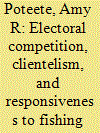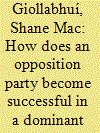|
|
|
Sort Order |
|
|
|
Items / Page
|
|
|
|
|
|
|
| Srl | Item |
| 1 |
ID:
169770


|
|
|
|
|
| Summary/Abstract |
Political clientelism is generally seen as an obstacle to democratic governance and inclusive development. The politics of access to Senegalese fisheries suggest a more nuanced relationship between elections, clientelism, responsiveness, and inclusion. Even where clientelism is pervasive, it takes different forms and interacts with electoral competition to influence the direction and form of political responsiveness. When elections are highly uncompetitive or when electoral turnover is highly likely, elections do little to constrain incumbents or discourage elite resource-grabbing. When electoral competition renders outcomes uncertain, however, politicians face incentives to court potentially influential blocks of voters with promises of decentralized clientelism. This article traces connections between the intensity of electoral competition and the politics of access to Senegalese coastal fisheries since the 1990s, focusing on the period before and after Senegal’s second electoral turnover in 2012. It argues that, while electoral competition may not reduce the prevalence of clientelism, it can influence whether national elites or ordinary voters are the main beneficiaries.
|
|
|
|
|
|
|
|
|
|
|
|
|
|
|
|
| 2 |
ID:
169772


|
|
|
|
|
| Summary/Abstract |
The unfair distribution of public sector jobs is a common grievance in many societies, but arguably more so in ethnically polarized ones. Using census data from Kenya and Uganda, two countries with a history of ethnic conflict, this article examines how public employment is allocated in multi-ethnic societies by studying the correlates of holding public sector jobs. The results demonstrate that the public services of Kenya and Uganda are first and foremost comprised of educational elites with considerably higher average levels of educational attainment than across the labour forces at large. However, when education is controlled for, high-skilled women and candidates from less developed districts are more likely to work for the state than others. As a result, public sector jobs are more equitably distributed along gender, regional and ethnic lines than education alone would predict. I hypothesize that formal policies to promote regional equity in the provision of basic services in combination with affirmative action measures are contributing to creating comparatively inclusive public services.
|
|
|
|
|
|
|
|
|
|
|
|
|
|
|
|
| 3 |
ID:
169778


|
|
|
|
|
| Summary/Abstract |
ON 15 FEBRUARY 2018, HAILEMARIAM DESALEGN, Ethiopia’s beleaguered prime minister, resigned. Bowing to pressure from within his own party,1 the Ethiopian People’s Revolutionary Democratic Front (EPRDF), Hailemariam declared that he hoped to facilitate an end to ‘unrest and political crisis’ in the country by leaving the national stage.2 If Hailemariam’s departure had taken observers by surprise, however, what was to follow would defy all predictions. His successor, Abiy Ahmed—whose elevation was unanticipated even by many within the EPRDF Politburo itself3—has, since his April 2018 inauguration, presided over a dramatic set of iconoclastic policy shifts. Perhaps most high profile amongst these has been the securing of a rapprochement with Eritrea, Ethiopia’s most bitter regional nemesis since the outbreak of a border war in May 1998.
|
|
|
|
|
|
|
|
|
|
|
|
|
|
|
|
| 4 |
ID:
169775


|
|
|
|
|
| Summary/Abstract |
The African National Congress has long been the brightest star in the firmament of the party system in South Africa, but its eminence is fading in the face of a rising Democratic Alliance. The success of the Democratic Alliance is instructive. The party barely survived the passage to majority-rule, but nonetheless escaped the gravitational pull of its historically narrow support base to challenge effectively for power across South Africa. The question is how has it come to present a credible challenge to the ANC, and whether there are broader lessons to draw from this example of a successful opposition in an African democracy. This article presents a theory explaining how the leadership of the Democratic Alliance made an expensive, unorthodox and risky investment in the party’s organization that centralized power in order to manufacture a new identity, which transformed the party’s capacity to appeal to new voters in South Africa’s political system. The rise of the Democratic Alliance demonstrates how, and under what conditions, the leadership of an opposition party can turn the debate at election time away from identity and on to issues and, in the process, disrupt the stability of a dominant party system.
|
|
|
|
|
|
|
|
|
|
|
|
|
|
|
|
| 5 |
ID:
169769


|
|
|
|
|
| Summary/Abstract |
Engaging traditional authorities in post-conflict development of the rule of law is expected to preserve progressive elements of traditional dispute resolution while reforming the despotic practices of such authorities. However, beyond this widely-held expectation, the peacebuilding literature has so far failed to specify which traditional functions are susceptible to change and the mechanisms for informal institutional change. Based on qualitative fieldwork on traditional justice in Sierra Leone, this article argues that judicial roles which have emerged in response to weaknesses in the modern state system can be destabilized by post-conflict institutional reforms aimed at (re)building the rule of law. This is because the problem-solving needs which precipitated those informal judicial functions can be altered by an effective state system and the cost most likely to inhibit institutional change in this reconstruction context is particularistic to traditional authorities. However, preference for traditional methods and practices outside this endogenous relationship raises a fundamental question about socially-relevant justice which cannot be addressed by a functional state system and whose disruption incurs widely dispersed sociocultural costs.
|
|
|
|
|
|
|
|
|
|
|
|
|
|
|
|
| 6 |
ID:
169776


|
|
|
|
|
| Summary/Abstract |
This research note interrogates the varied ways in which researcher and research subjects’ intersectional identities complicate multiple levels of access to research participants, specifically with respect to research I conducted with refugee women who returned to Liberia after the end of the civil war in 2003. I argue that motherland (or nationality) and motherhood (or maternity) produce ‘minefields’ during fieldwork that a researcher has to navigate in achieving different levels of access to research subjects, particularly in postconflict situations. While the literature mostly discusses these issues from the perspective of non-Africans conducting fieldwork abroad, this essay analyses issues arising from being a young, female Nigerian conducting research with women, mostly mothers, in the same African sub-region. It explains how being a young, married, pregnant, and mothering Nigerian facilitated or obstructed access to research participants. This foregrounds the complexity of the insider/outsider debate for researchers conducting fieldwork in various contexts, and thereby contributes to the wider literatures on feminist methodologies and qualitative fieldwork.
|
|
|
|
|
|
|
|
|
|
|
|
|
|
|
|
| 7 |
ID:
169777


|
|
|
|
|
| Summary/Abstract |
ON 21 MARCH 2018, 44 OF THE 55 MEMBERS of the African Union (AU) signed the African Continental Free Trade Area (AfCFTA) agreement.1 The agreement required members to remove tariffs from at least 90 percent of trade within the continent. The initial agreement was not signed by Benin, Botswana, Burundi, Eritrea, Guinea-Bissau, Lesotho, Namibia, Sierra Leone, South Africa and Nigeria. Although South African officials cited merely technical legal reasons for their failure to sign,2 the Nigerian president expressed fear that free trade might hurt domestic industries. In essence, the AfCFTA raises a number of issues usually associated with free trade: social cost, private adjustment cost and public adjustment cost.
|
|
|
|
|
|
|
|
|
|
|
|
|
|
|
|
| 8 |
ID:
169774


|
|
|
|
|
| Summary/Abstract |
Voluntarism has proven a resilient template of public action in Tanzania, from the colonial to the contemporary period. In its most recent articulation, formalized voluntary work by Tanzanian citizens has again become integral to a range of development interventions, as throughout Africa, promoted by NGOs and government agencies alike. Renewed academic inquiry into such work has had a tendency to marry voluntarism to other familiar logics of ‘African’ politics, echoing verticalized strategies of extraversion. Such analyses lose sight of the enduring symbolism of the ‘public’ and its civic sensibilities, and thus the variegated matrices of social action more broadly. Whilst there is something distinct, therefore, in the nature of the public in Tanzania, there is nothing unique in how the public, and its supporting claims and obligations, are negotiated by ‘non-elites’ in the everyday. This article scrutinizes the legitimating work of voluntarism for NGO and government actors in Bagamoyo. It then explores how these claims are appraised by village volunteers. For these Tanzanian volunteers, voluntarism is not just an opportunity for ‘incorporation’ into particular work economies, but for the negotiation of public authority itself.
|
|
|
|
|
|
|
|
|
|
|
|
|
|
|
|
| 9 |
ID:
169771


|
|
|
|
|
| Summary/Abstract |
From inauspicious beginnings in a post-socialist, highly dysfunctional financial system, Angolan banking grew in less than a decade after the end of the country’s long civil war into one of Africa’s largest. Fuelled by the country’s oil boom, banks became crucial in articulating Angola’s interactions with the international system as well as a domestic agenda of oligarchic consolidation by the ruling MPLA’s elite. This article describes and analyses this growth trajectory in its historical and institutional context and seeks to understand the reasons why it did not lead to either a significant expansion of credit outside the elite or a contribution towards economic diversification outside the oil sector. Important as a study of the political economy of finance in Africa’s third largest economy, the article also contributes to the growing literature on the nexus between banking and politics in resource-rich states.
|
|
|
|
|
|
|
|
|
|
|
|
|
|
|
|
| 10 |
ID:
169773


|
|
|
|
|
| Summary/Abstract |
Recent literature on Sino-African resource politics emphasizes the agency of African elites in relation to Chinese capital and state agencies, yet whether African elites have gained agency over the structure of African economies remains debatable. This article questions how agency has been understood in analyses of Sino-Africa relations by identifying the nature and limits of Ghanaian agency in bilateral and multilateral aid relations since the discovery of oil in 2007. First, although the agency of Ghanaian elites has shaped the outcomes of recent bilateral investments, Ghanaian state agency has been exercised primarily in brokering external sources of finance and in relation to domestic institutions and political factions. Second, Chinese investment did shift the aid modalities and the relative power of Ghana’s traditional development partners, but international finance institutions and US agencies maintained influence over macro-economic governance and sectoral policy, respectively. As such, the scope of Ghanaian agency in relation to external finance and bilateral and multilateral relations was narrow, and market orthodoxies of development remained dominant. Undue attribution of agency over economic and political structures can be avoided by situating African agency within the social and material context of transnational industries.
|
|
|
|
|
|
|
|
|
|
|
|
|
|
|
|
|
|
|
|
|